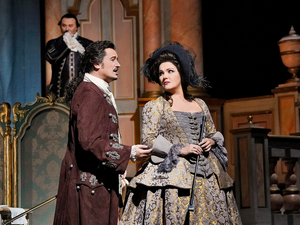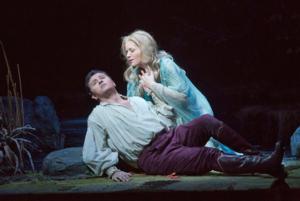Best of BWW Interviews: In RUSALKA or RIGOLETTO, ADRIANA or an Almost-WERTHER at the Met, Piotr Beczala's a Tenor with Style

Photo: Ken Howard/Met OperaCaption
It's a busy week for Piotr Beczala, at least on the Met on Demand. It started with Monday's free broadcast of 2014's RUSALKA, opposite Renée Fleming (when the interview that follows was conducted) to Saturday night's free ADRIANA LECOUVREUR performance opposite Anna Netrebko, from January 2019.
In addition, there are excerpts from WERTHER, opposite Joyce DiDonato, which was scheduled for last month at the Met, but sidelined by COVID-19 and only available online. These arias were recorded in JDD's living room, to give audiences a glimpse of what they might have missed in the complete performance. They are available on YouTube.
It's interesting to note some of the changes in the career path he foresaw--including his move into a more varied repertoire, including heavier works like LOHENGRIN.
As previously mentioned, this interview took place in 2014, during Beczala's run in RUSALKA at the Met.
He was the dashing yet fickle prince in the Met's HD Live broadcast of Dvorak's RUSALKA and the womanizing Duke who concluded that "La donna e mobile" ("Women are fickle") in last year's "Ratpack" RIGOLETTO at the Met as well. Yet, Polish tenor Piotr Beczala is true-blue--to musical style.

Photo: Ken Howard/Met Opera
Speaking with me in his dressing room backstage at the Met, Beczala came across as a very serious--and cautious--artist who thinks a great deal about his roles and how to best serve the music. "I know everyone goes his own way in shaping a career," he said.
"Colleagues are singing everything--insalata mista--one week it's Don Carlo, the next week Romeo, then Werther, then BALLO, whatever. I don't like it." He continued, "I believe in style--French or German style, Slavic style, Italian or Italian verismo style. You can't do them all at the same time, unless you do everything in the same way. And that's not style," he concluded.
Short yet demanding
What kind of style is the Prince in RUSALKA? Obviously, it's Slavic, but there's more to it, which makes this relatively short role (only four scenes) so demanding. "As a fach--the system developed in 19th century Germany to categorize voices in an opera--it is almost a dramatic tenor role, because of the range and because the orchestration is very heavy," he explained.
Is this the heaviest role that Beczala does? "Well, you can't compare it with the big roles, like, on the French side, Gounod's Romeo, which has very dramatic moments in the Third Act," he said. "Also, Act Two of WERTHER is very dramatic, but the basic character of the role is the same throughout the opera.
"For the Prince, the first act is light then for the rest you have to produce a very dramatic sound--but even in the lyric moments the character is so dramatic." He continued, "Because the role is so short, I can't put this in the dramatic part of my repertoire--BALLO is much more dramatic from beginning to end, more singing--but people in Western Europe and America think it's very dramatic because the language is so foreign."
Heaviness is the challenge
"Even my teacher told me 'oh, Rusalka, it's very dramatic, it could be a problem.' I said why? I know the language, I know the color of the language. I know how to pronounce it properly but also how to project the voice in the right way, to use the vowels and consonants." He repeated, "For me, the difficulty of the role is: It's very high, very low, very dramatic, very lyric--all in four short scenes. Then there is the long break between the second and third acts--more than one hour. I could go and sing a recital in that time!"
Next season he is singing another of the heavier Slavic roles, the Graf Tristan Vaudemont in Tchaikovsky's IOLANTA in its debut production at the Met, which he has sung numerous times elsewhere (including Salzburg). He describes it as "expressive--but not Canio," referring to the starring part in Leoncavallo's I PAGLIACCI, one of the landmarks of Italian verismo.
No way back
Beczala doesn't sing any of the verismo roles...yet. "That is the sound of the future. It is a very significant decision to put it off because, in my opinion, there's no way back. To sing this kind of repertoire, you have to put away some of the lyric stuff because you can't make all these things on the same level," he avers. "I refuse to make big compromises like that. RUSALKA already calls for some compromises, but if one starts singing Turiddu (CAVALLERIA RUSTICANA) or Canio, Luigi in IL TABARRO or the heavy Verdi, it's something else entirely. I don't believe you can go back and find the softness of your voice, because of the high tessitura and technical demands in these roles.
"To be sure, the dramatic roles can be sung in a lyric way, like they did 70-80 years ago and I'd love to do this, but it's not realistic," he explains. "The expectations--from opera houses, directors, audiences--are different. They want the big sound." Do these kinds of expectations dictate which operas he will do? Again, expressing his conservative attitude toward vocal "risk management," Beczala admits, "I'm a singer who has stayed longer in the safe region of my voice and I've slowed down the development of my repertoire because I would love to extend my lyric roles as long as possible. When I get to the point when it doesn't work anymore, then I'll go to the next step."
Wagner is not scary
Of course, that doesn't mean his dance card isn't filling up for future seasons. He did his first BALLO IN MASCHERA four years ago and enjoyed it but he knows that the next step would be Manrico in IL TROVATORE or Radames in AIDA. But could he do those and still be a believable Romeo? That remains to be seen for him. Nevertheless, he looks forward to a schedule that includes a BALLO at the Met and debuts in TROVATORE and LOHENGRIN at Covent Garden and in Dresden.
LOHENGRIN--isn't he afraid of Wagner? "Not anymore. I used to think that his music was fantastic but he didn't care about the singers he wrote for. And because the tenor voice is so delicate, the first thing is to survive every performance. For me, it's not enough for me to survive the evening," he admitted. "I spent much time in discussion with conductors and colleagues about LOHENGRIN--which many lyric tenors have taken on--and last year I spent a working afternoon at Bayreuth speaking to Christian Thielemann about doing the opera." Beczala confirmed, "It's a very nice role--it's well built, has a very nice line, and it's not that big because you have huge breaks. But it's still Wagner and you have to create the right tone--one especially for Wagner--but the role it fits very well in the voice."
Living up to his own standards
Giving a good performance is definitely important to Beczala for many reasons--because of audiences, because of the fans on Facebook, because of the younger singers who come back stage for an impromptu master class after a performance, and, of course, because of his own standards. In addition, in today's world of the instantaneous news cycle, when you give a bad performance, there's no place to run or hide.
"We record almost every performance--HD, live recordings, radio broadcasts. (That doesn't include all the iPhones making illegal recordings and posting online.) It comes back to haunt you if you're not good. A hundred years ago, only the reviewers were the witnesses of the time. 'Oh Mr. Caruso had a fantastic day, he had a high B in AIDA.' That was it. Today if you want to know how Beczala is singing, you go to the Internet, you can hear it for yourself. (Note: You can hear his show-stealing takes on Lenski from EUGENE ONEGIN and the Duke in RIGOLETTO, among other roles, on YouTube.) For me, it is fantastic--it is our eyewitness for history. We opera singers are ordinary people but we have a fantastic job--and the Internet lets us be very close to the public.
"Can you imagine, last century, Enrico Caruso went on the top of his car, went 'winkie winkie' to the public and then disappeared into his private life," he opined. "Today, fans see us walking around Lincoln Center and say hello. I'm not comparing myself to Caruso--he was one and, finito!--but I mean we are in the same roles, in the same opera company, on the same level and that's something really special--and I'm very proud of it."
###
Keep up with the free operas from the Met On Demand Library from the website.
Play Broadway Games
Videos





%20(1024%20×%20512%20px).png)
